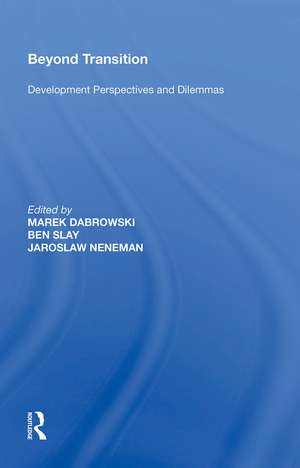Beyond Transition: Development Perspectives and Dilemmas
Autor Ben Slay, Marek Dabrowski, Jaroslaw Nenemanen Limba Engleză Paperback – 28 feb 2022
Preț: 245.73 lei
Nou
Puncte Express: 369
Preț estimativ în valută:
47.04€ • 51.11$ • 39.54£
47.04€ • 51.11$ • 39.54£
Carte disponibilă
Livrare economică 31 martie-14 aprilie
Livrare express 14-20 martie pentru 26.86 lei
Preluare comenzi: 021 569.72.76
Specificații
ISBN-13: 9781138356603
ISBN-10: 1138356603
Pagini: 307
Dimensiuni: 152 x 235 x 20 mm
Greutate: 0.44 kg
Ediția:1
Editura: Taylor & Francis
Colecția Routledge
Locul publicării:Oxford, United Kingdom
ISBN-10: 1138356603
Pagini: 307
Dimensiuni: 152 x 235 x 20 mm
Greutate: 0.44 kg
Ediția:1
Editura: Taylor & Francis
Colecția Routledge
Locul publicării:Oxford, United Kingdom
Cuprins
Contents: Is there room for national monetary policy in the global economy?; Costs and benefits of monetary sovereignty in the era of globalization; Assessing dollarization; Exchange rate and monetary regimes; Why unilateral Euroization makes sense for (some) applicant countries; Exchange rate regimes after enlargement; Labour market flexibility in Central and East Europe; Labour market reform: lessons from Spain; Designing labour market institutions; Tax systems in transition; Tax reforms in the Baltic States; Weak institutions, fiscal policy, and low equilibria; Privatization and corporate governance; Growing irrelevance of corporate governance; Links between privatization and other policies; The EU enlargement: consequences for the CIS countries, Russia's relations with the EU: problems and prospects; Central European experience and the CIS; Index.
Notă biografică
Marek Dabrowski (Edited by) , Ben Slay (Edited by) , Jaroslaw Neneman (Edited by)
Descriere
Beyond Transition focuses on the economic problems and issues facing Central Europe and the Baltics, the Balkans, and countries belonging to the Commonwealth for Independent States (CIS) in the post-transition context. This focus reflects the need to better understand two processes that are increasingly apparent in the post-communist economic space.
